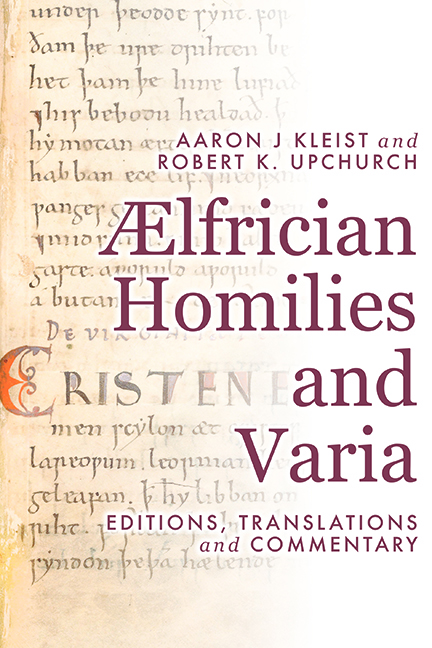Book contents
- Frontmatter
- Contents
- Preface
- Acknowledgements
- Abbreviations
- Sigla for Cited Ælfrician Manuscripts
- Dates for Cited Ælfrician Works
- Editorial Conventions
- Conventions Used in the Commentaries
- Homilies The Proper of the Season
- Homilies The Proper of the Saints
- Ælfrician Homilies and Varia: Editions, Translations, and Commentary: Volume II
- Homilies The Common of the Saints
- Homilies Unspecified Occasions
- Varia
- Works Cited
- Index
- ANGLO-SAXON TEXTS
12 - Menn Behofiað Godre Lare (‘People Need Good Teaching’)
Published online by Cambridge University Press: 05 March 2024
- Frontmatter
- Contents
- Preface
- Acknowledgements
- Abbreviations
- Sigla for Cited Ælfrician Manuscripts
- Dates for Cited Ælfrician Works
- Editorial Conventions
- Conventions Used in the Commentaries
- Homilies The Proper of the Season
- Homilies The Proper of the Saints
- Ælfrician Homilies and Varia: Editions, Translations, and Commentary: Volume II
- Homilies The Common of the Saints
- Homilies Unspecified Occasions
- Varia
- Works Cited
- Index
- ANGLO-SAXON TEXTS
Summary
Menn Behofiað Godre Lare (‘People Need Good Teaching’) is a short sermon that argues for the necessity of good teachers and good instruction if Christians are to remain steadfast in their faith in the Last Days when the Antichrist will arrive. Like Esto consentiens aduersario (AH II.11), the sermon is for an unspecified occasion and a late work that reuses earlier material. As best we can tell, sometime between about 1006 and 1010, Ælfric decided to replace an earlier, nearly identical sermon on the subject with Menn Behofiað. He had written the earlier sermon, Læwede Menn Behofiað Godre Lare (‘Lay People Need Good Teaching’ [Appendix 1]), between 1002 and 1005. It consisted of an excerpt on good teaching and the end times from the vernacular preface to the First Series of Catholic Homilies written in 991 and a new alliterative sentence that served as a conclusion. Then, between about 1006 and 1010, as he was revising and enlarging the First Series for a set of homilies that did not include its Latin and Old English prefaces, he decided that a sermon like Læwede Menn would make an appropriate pendant to his sermon for the first Sunday of Advent (CH I.39), shifting as it does the text's focus to Christ's second advent on Judgment Day. But rather than simply append Læwede Menn to the Advent sermon, he used a different version of the same excerpt from the preface that he apparently had augmented some years earlier, likely between 991 and about 998, since the two brief additions are in ordinary prose. To the augmented excerpt, Ælfric added the final alliterative sentence from Læwede Menn to conclude the composite Advent homily, which we have edited below as Et hoc scientes tempus (‘And [do] this knowing the time’ [Appendix 2]). Finally, during this same period, he was also reproducing a group of short texts that included Læwede Menn, but he appears to have replaced the earlier homily with the pendant of the Advent homily now extracted as the independent piece, Menn Behofiað Godre Lare.
In Menn Behofiað, Ælfric causally links good teaching and steadfast belief to encourage Christians to bear up under affliction during the last age of the world between Christ's Resurrection and Second Coming.
- Type
- Chapter
- Information
- Ælfrician Homilies and VariaEditions, Translations, and Commentary, pp. 629 - 678Publisher: Boydell & BrewerPrint publication year: 2022



